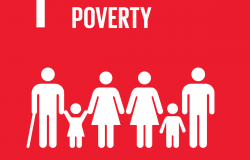
This paper asks whether the UN Sustainable Development Goal to end poverty is achievable in the aftermath of the COVID-19 pandemic. We discuss various estimates of the poverty impact of the pandemic. We then differentiate growth-poverty-inequality pathways based on empirical observations from developing countries over the last 25 years. We take the most equitable growth pathways (characterised by mean household income/consumption expenditure growth per capita with the largest falls in inequality) and least equitable growth pathways (mean household income/consumption expenditure growth per capita with the largest rises in inequality) as a basis to extrapolate potential scenarios for poverty levels in 2030. Our main finding is that the SDG to end poverty is achievable (or something close) if the impact of the pandemic on income poverty is addressed and countries are able to follow the most equitable growth pathway after the pandemic has abated. In short, the greatest poverty reduction, and greatest likelihood of attaining the SDG poverty reduction goals, will occur if economic growth is combined with inequality reduction. In other words redistribution with growth.
Policy Implications
- Our main finding is that the SDG-1 to end extreme poverty at the $1.90 line is achievable if the impact of the pandemic on income poverty is addressed and countries are able to follow the most equitable growth pathway after the pandemic has abated; though this would still leave much poverty at more reasonable lines of $3.20 and $5.50-per-day.
- Our conclusion is that given that growth itself will be challenging post-pandemic due to foreign debt servicing and on-going COVID-19 costs, both national and global redistribution via public policy will be needed to meet the SDG to end extreme poverty.
- We note the achievement of falling inequality will only be politically feasible with the resumption of reasonable growth in developing countries because inequality reducing measures are politically difficult and unlikely in the absence of economic growth.